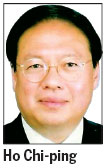China is the 'Good Samaritan' to Africa
Updated: 2013-05-01 07:04
By Ho Chi-Ping(HK Edition)
|
|||||||

China has a proud record of giving financial, medical, technical and other forms of help to Africa that goes back to 1956, when the People's Republic of China was just 7 years old and dirt poor. Although Africa is on the other side of the world from China, it is home to the majority of the world's poorest countries, several of which do not have power connections, while at least one still practices slavery. Altogether, in the past 50 years, China has given Africa 44.4 billion yuan ($7.2 billion) in aid, ranging from major infrastructure projects to facilitate economic development to helping fight the scourge of AIDS.
Now China is extending still more aid to Africa by offering to share with its countries the lessons China learnt the hard way during its extraordinary transformation from a rural economy to an industrial powerhouse in just 35 years.
By drawing on this knowledge it is hoped that at least some of these poor countries can seize the opportunities while capitalizing on their countries' unique strengths and advantages to upgrade the health and living standards of their peoples.
China's experience is that sustainable growth involves a delicate balancing act that involves multiple competing forces and needs. Not everything China did was successful, especially in the early days after introducing reforms and opening-up in 1978-79. But having done the "hard yards" and learnt from its mistakes, China can show Africa a whole series of shortcuts that lead to success.
The fact that China has been so helpful to Africa stands in stark contrast to the leading Western countries, which have mostly shunned its needs, although until the 1950s and 60s most African countries were still Western colonies.
Further, if we accept the findings of anthropologists that mankind evolved in Africa and spread from there to Asia and Europe, it would seem that our modern civilization should show a degree of care and responsibility to the residents of our collective ancestral home - Africa.
Sadly, however, Africa remains one of the most blighted and backward parts of the world. Of the 20 poorest countries in the world, 18 are African, with a total population of 394.7 million people. Africa is also the continent where HIV/AIDS have claimed the largest numbers of victims.
Formerly colonies of European countries, all gradually won their independence under the cry of uhuru (Swahili for 'freedom'). Their former colonial masters returned to their homelands and with only a few exceptions left them to their own devices. It is mainly China that has played the role of Good Samaritan, by extending so much unconditional aid to help Africa along its development path.
In a broader sense, what China has done in Africa is actually a continuation of the industrious and imaginative Chinese people's contribution towards the development and progress of human civilization in earlier times through inventions such as the compass, papermaking, silk production, gunpowder, printing and most importantly, its philosophy of peace and harmony advocated by its wisest thinkers.
In the Ming Dynasty (AD 1368-1644), Admiral Zheng He and his powerful fleets were sent from the South China Sea to the Indian Ocean, to Africa and, arguably, even to America, some 71 years before Columbus. Whereas Julius Caesar said "I came, I saw, I conquered", Zheng said "I came, I saw, I made friends, and I went home". Not one battle was fought, not one colony seized, and nobody was enslaved.
But after the Western colonialists descended on China in the 19th century to "open it up for trade" at gunpoint, peace-loving Chinese suffered almost ceaseless humiliation from foreign invaders for two centuries.
Now, however, everything has been reversed. The West struggles to pay its bills while China is on the cusp of a new period of prosperity - prosperity we are unselfishly sharing with the most underprivileged part of the world - Africa.
The author is deputy chairman and secretary-general of China Energy Fund Committee, a think tank on energy and China-related issues.
(HK Edition 05/01/2013 page1)